Marbeth Skwarczynski's Blog, page 3
January 23, 2024
A Deeper Love by Heidi Gray McGill

Heidi Gray McGill is a consistently great author, so I knew that reading her contribution to the Suamalie Islands series, A Deeper Love, would be a treat. It is a sweet romance that kept my interest so well that I finished the novel in a day.
Alicia has made significant sacrifices to run her business, SCUBA Deux Adventures. She loves her career and adores her boat pilot, Tug. But, deep inside, she wants it all: the ring, the courtship, the pitter-patter of little feet, and the happily ever after. Of course, that also means she might just have to start dating.
Dan needs to get away. His entire life has been planned for him, and he’s been expected to execute his role in the family business without argument. He has every advantage but one: he has no idea how to make important life decisions on his own. He’s never had to. But booking a trip to the small island of Tiga for a week of diving is a great place to start. One thing is for sure: after meeting Alicia, he never wants to go back to his old life.
A highly recommended contemporary Christian sweet read.
About the BookBook: A Deeper Love
Author: Heidi Gray McGill
Genre: Christian Contemporary Romance
Release Date: October 31, 2023

What was that movie line about relationships built on intense experiences? Oh, yeah. They never work.
I get paid to do my dream job, usually by wealthy men who thrive on adventure. But when their adrenaline rush is gone, and vacation is over, I’m still here, on a tropical island, with people who mostly leave me alone. And I like it that way.
Except for this guy. Seriously, Dan is the last man I want to get involved with. If he got Decompression Illness, the doctors would likely call it Mercedes Bends. He’s privileged and entitled and would never leave his city life behind for the challenges of living on a remote island. Which is a total relief, I’m telling you.
Don’t get me wrong—he’s prime shark bait, but I’m not ready to fall deeply in love with someone who won’t stay. There’s no such thing as going “too deep” where spiritual things are concerned. But when it comes to relationships, I’ll stay at the surface and snorkel rather than dive into the depths.
Take a trip to the Suamalie Islands, where palm trees sway, the sand and sea pulse with life, and the people will steal your heart.
Click here to get your copy!About the Author
Whether historical or contemporary, you will find Heidi’s Christian Fiction works to be full of God’s redeeming love.
Everything Heidi writes is purposeful. She believes in bringing a reader into the awareness of who God is to them and how He interacts with them on a personal level. She does this by crafting characters so relatable you feel part of who they are.
Heidi reaches deep into the reader’s heart through masterfully written words and offers ways toward healing by seamlessly applying God’s Word throughout her stories.
Heidi and her husband of 30+ years live in South Carolina. Besides writing Christian fiction with relatable characters in life-changing stories, Heidi relishes time with family and friends. She enjoys scrapbooking, playing games, traveling, and building bridges with her grandsons that must fall with a loud crash and usually involve a monster truck.
More from HeidiMy husband and I are scuba divers. I prefer clear water, bright fish, live coral, and the gentle swells of the ocean. I also enjoy the peaceful cenotes of Mexico, where being above water is just as stunning as being under. My husband has taken me to some remote and beautiful places.
My favorite scuba trip was to the Island of Dominica in the Caribbean, where my parents served as volunteer missionaries. On that trip, I saw a baby octopus and felt the boiling water from the active volcano vents as it bubbled up from the ocean floor.
My husband prefers diving for shark teeth and treasure in murky, fast-moving, brackish water. He thinks running into alligators, catfish the size of large dogs, and snapping turtles is part of the adventure. He also is an extreme cave diver, relishing the challenge of seeing places few have ventured. Small places and dark water are not my thing.
Owning a scuba shop seemed like the natural choice for my main character in A Deeper Love. Being able to share the underwater world and beauty of a tropical island through words became my next challenge.
Alicia Garry, affectionately known as Algae, is as formidable as her military father. She’s adventuresome and intelligent unless it comes to love. Then, she lives up to her family name, which means watchful in French. Relationships with clients never end well since they always leave, so she keeps things professional with her customers.
That is until she meets Daniel McMaster. Like most of Alicia’s clientele, Daniel is a businessman who craves adventure from his dull life. He comes from money, makes and spends money, and is way out of her league.
When she has feelings for Daniel, she wonders if she’s swallowed a bit too much seawater.
In A Deeper Love, you’ll meet a boat captain with cheesy jokes, a kind neighbor child who melts hearts, and a God who knows the future. Throw in some Little Mermaid quotes and songs, and this story comes alive with romance and Algae’s desire to be part of Daniel’s world.
Book a trip today with Scuba Deux Adventures Dive Shop, where you’ll embark on an adventure far beyond the ocean’s depths.
Blog StopsWhere Crisis & Christ Collide, January 15 (Author Interview)
Lighthouse-Academy, January 15
She Lives To Read, January 16
Texas Book-aholic, January 17
Truth and Grace Homeschool Academy, January 18
Library Lady’s Kid Lit, January 19
Locks, Hooks and Books, January 20
Happily Managing a Household of Boys, January 21
Debbie’s Dusty Deliberations, January 22
Sylvan Musings, January 23 (Author Interview)
The Lit Lady, January 23
Simple Harvest Reads, January 24 (Guest Review from Donna Cline)
For Him and My Family, January 25
Holly’s Book Corner, January 26
Karen Baney Reviews, January 27
Gina Holder, Author and Blogger, January 28 (Author Interview)
Giveaway
To celebrate her tour, Heidi is giving away the grand prize package of a $25 Amazon Gift card and a copy of the book!!
Be sure to comment on the blog stops for nine extra entries into the giveaway! Click the link below to enter.
https://promosimple.com/ps/2979f/a-deeper-love-celebration-tour-giveaway
January 20, 2024
My Go-To Classic Christian Novel
[Just a warning that the following article is me nerding out over a favorite book. There are spoilers, but it’s a book from 1848, so …]
The Tenant of Wildfell Hall is my go-to suggestion for anyone looking to read a classic Christian novel. It’s a perfect example of contemporary Christian fiction and its ability to expose flaws in the system while encouraging the reconstruction of one’s faith.

I came to the book much too late. I watched a Christmas episode of Downton Abbey where Lady Mary acted out the title during a game of charades. I looked it up, discovered it was a book by one of the Bronte sisters, and jotted it down, wondering why I’d never heard of it before. (Yes, I am THAT kind of nerd; I’ve found several favorite books because of passing mentions in movies and on TV.) I snatched it up when I saw it on a table of paperback classics at Barnes and Noble. Once I started reading, I found it nearly impossible to put it down.

You know the phrase, “The more things change, the more they stay the same”? The Tenant of Wildfell Hall embodies this sentiment. If a movie studio decided to make it into a film set in the modern day, the only things that would change would be clothes and transportation.
As far as I know, a remake hasn’t happened yet, but there is a 1996 miniseries available on Tubi (a free streaming service) right now.

The story is told in a series of letters from Gilbert Markham to his friend about the sudden arrival of a mysterious widow in his town. She was residing on an ancient estate that had been abandoned for years, living in only a few rooms of the Elizabethan manor. At first, she kept to herself, refusing to participate in the social practice of visiting others in their homes by claiming that she and her five-year-old son lived too far from everyone. He could not walk the distances, and he was too heavy for her to carry. She immediately shut down the suggestion that she leave her child at home with her servant while she socialized.
That was all anyone knew of Helen Graham, yet it was enough to get rumors started. She was labeled rude, unsociable, and—if the term had been available back then—a helicopter parent. Gilbert knew what was being said but didn’t care because it had nothing to do with him.
Ah, Gilbert! He may be the book’s hero, but that status is a long time coming. The character’s assessment of the man he used to be is less than flattering. Gilbert believed he deserved his mother’s doting and high praise simply because he was the eldest son and (because of his father’s early death) the de facto head of the family. His siblings’ objections only meant they were jealous; after all, everyone else in town seemed to agree with Mother. Even the local pastor put Gilbert on a pedestal. He loved having Gilbert over for a good long talk, and there was hope that Gilbert might make his obvious attraction to the pastor’s daughter “official.” In his letters to his friend, Gilbert expresses regret that he’d strung the girl along, enjoying her admiration and affection—and even some secret kisses—all the while knowing he never wanted to marry her.
Gilbert was a cad. A cad with no reason to change because, according to everyone around him, he was just “being a man.”
And then Gilbert meets Helen Graham. Once the weather is warmer and her son is a little stronger, she accepts an invitation to the Markham house for a casual party. Gilbert is ready to judge this woman he’s only heard about as “strange,” but when he finally meets her, he judges her as even more odd than he expected.
If Helen Graham were a modern heroine, we would say she saw “all the red flags.” More than that, she called out bad behavior. She wasn’t quite like TikTok’s Dustin Poynter, waving a giant red flag while spouting southernisms learned from a colorful grandma. Instead, Helen quietly but clearly stated her boundaries, pointed out why certain practices were not good for her and her son, stood up for herself, and refused to back down. Her behavior shocked not only the characters in the book but the readers as well.
Helen was a revolutionary character.
As hard as it is for women today, especially women in some religious communities, to clearly set boundaries and enforce them, it was unheard of for a woman in 1848 to do so. And she was just getting started.
Helen’s ideas and confident attitude intrigued Gilbert. He found excuses to visit her and her son at the crumbling Wildfell Hall. He discovered she was a talented artist, but unlike most women he knew, she didn’t paint as a hobby. She had turned her talent into a career that supported her, her son, and a single servant. Her work gave her a sense of financial security and independence so, unlike most women he knew, Helen Graham wasn’t on the “hunt” for a husband. She spoke to Gilbert as an equal, let him know she wasn’t interested in pursuing a romantic relationship, and demanded he treat her as a friend or leave her be.
This begins Gilbert’s instruction on how to treat and talk to women appropriately. He certainly hadn’t learned it from his doting mom. Mom believed any woman who married her son was lucky to get such a perfect guy. How dare they attempt to change him? He was practically perfect! All a wife needed to do was ensure he was well fed, had a clean and welcoming home, and a bit of pleasant companionship in the evenings. She was to take over his mother’s care for him.
Under Mrs. Graham’s influence, Gilbert began to realize how infantilizing his mother’s treatment was. It was embarrassing, so he started making some changes.
Then, Gilbert began questioning some of the pastor’s teachings. The man was confusing English cultural standards with biblical instruction. There was a lack of Bible insight, but plenty of opinions being shared. The man went so far as to criticize Mrs. Graham for NOT giving her child beer or wine, claiming that by withholding those “blessings from God,” she was going to make him weak and unmanly. The boy would make a terrible Englishman if he never learned to drink properly.
The pastor also encouraged his daughter to pursue Gilbert, but Gilbert realized she wasn’t the woman for him and officially ended it, infuriating the minister’s family. They’d had high hopes of marrying into his wealthier Markham clan.
Though Gilbert is slowly growing up, he has a serious setback when he assumes that Mrs. Graham is romantically entangled with her landlord, a man from an estate on the other side of town. Helen had declared she had no interest in starting a relationship, so Gilbert was enraged at her hypocrisy and jealous that the man she’d chosen wasn’t him. He’d come to appreciate her friendship and had unwittingly fallen in love. But he wasn’t going to pressure her. Instead, he’d decided to wait until she returned his feelings. The strange thing? It seemed like she WAS returning his feelings. They were closer than ever, but now it all seemed like he was the loser in a game he didn’t even know he was playing.
When Gilbert calmed down enough to talk to her, he discovered she was packing to leave. She had no time to explain the complexities of her situation, so she tore out the last few pages of her journal and handed it to him with the instructions that he read it and learn all her secrets.
This begins the book’s second half, told from Helen’s viewpoint, tracing her life from culturally appropriate young debutante to immature bride to trapped wife to desperate mother. Like so many before and after her, Helen could have crumbled under the pressure of cultural and religious expectations and remained in an abusive marriage. Instead, she studied the Bible on her own and developed a sense of self as an image bearer of God and the protector of her child. She learned to set boundaries. She demanded her body be respected. She planned an escape and asked for help. Finally, she reconstructed her life so that she could have a career, giving her and her little family some financial security.
Helen Graham was revolutionary because she lived by biblical principles instead of cultural ones.
Helen’s written words help Gilbert as he finishes maturing into a man worthy of such a woman. She is gone from his life, and yet everything he does is accomplished with the view of what Helen would think. As he grows emotionally and spiritually, Gilbert FINALLY becomes the hero we always knew he could be.
There is a reason this book is my go-to suggestion for a Christian classic. I am not only passionate about the story and characters, but I am also impressed at how beautifully Anne Bronte exposes the systems of oppression in her culture.
I have nowhere near Anne Bronte’s talent, but as a Christian novelist, I do share her desire to turn a spotlight onto the spiritual/church/religious abuse that is happening in Christian homes and churches today.

The old Gilbert Markham can be found in most congregations. They’ve reached the pinnacle of Christian manhood—at least according to their mothers and church leadership—and lack only a willing woman to devote her entire life to him through marriage. Few of those men, however, learn the strategies they need to grow up. They become petulant husbands, demanding their wives’ full attention, even if that means her sitting silently while he paints a wall or watches a television show. If their marriages are unhappy, all of the blame is laid on the wife. She must not be submissive enough, attentive enough, or willing enough. The new Gilbert Markham would be embarrassed at the stagnant immaturity of those men.
Helen’s late husband (described in detail in her journal) has his sin viewed as “acceptable” according to his rank (powerful position) and the culture of the day. He, too, can be found in many congregations. Not only will his sin be overlooked, but in many cases, it will also be covered up.
It seems grim; however, Anne also gives us hope in her book. Gilbert Markham GROWS UP. He becomes an intelligent and well-rounded man. He learns the value of friendship and love, and he shares the secrets of his success in his letters to his friend.
Helen leaves an abusive situation. She starts her life over as a career woman whose primary goal is to protect her son.
Fall into friendship with Gilbert and Helen. You’ll love them, and they might just inspire you. If you’ve never read Tenant of Wildfell Hall, get a copy ASAP.
There is also a brilliant Audible version available.

January 13, 2024
Pilgrims and Plus-sized Heroines
It’s officially mid-January. The chill isn’t leaving my apartment, so I’m writing while snuggling under a fluffy robe and a blanket. My Christmas tree is still up. I’m not ready to let it go just yet. I’m trying to convince myself to get up and pour another cup of tea, but if I get up, I know I’ll also need to throw a load of darks into the washer and empty the dishwasher. It makes me wonder if that hot, sweet brew is worth it.
Who am I kidding? Of course, it is.

I know I’m not alone in enjoying my early winter coziness. So many readers are practically giddy at the thought of being snowed in with their stacks of books and cups of hot chocolate. I live near Las Vegas, so the snow is a no-go. However, I AM an introvert, and hunkering down at home to write is my normal.
So is lurking on social media. I go online to keep up with what people say about books (and to watch cat videos, but that’s another blog post). This week, two particular posts caught my eye. One was outrageous, and the other was sweetly humble. They couldn’t have been more different. Yet, the reactions to the posts were oddly similar.
The first was a reel on Instagram by a “Christian influencer” saying that the Christian fiction alternatives to popular fiction—which she’s never read because there are “always Pilgrims on the cover”— aren’t good. We’d be better “staring at the ceiling” than reading them.
For reference, here is a shot of my ceiling that I accidentally took and have yet to delete from my phone’s storage. Enjoy.

My first thought was, why are there still gatekeepers to Christian fiction? And why do they denigrate an entire genre of literature while simultaneously admitting they’d never actually read any of it?
Of course, I already know the answers to these questions. There are still gatekeepers because there are still people who love having power over others. They ignore the presence and work of the Holy Spirit and take its place as the consciences of their followers. They denigrate others to make themselves look more spiritual, intelligent, and superior to the lowly readers who enjoy something as common as fiction.
Entertainment gatekeepers have always been around. I grew up in churches where gatekeeping was done from the pulpit. We were told what television shows to boycott, what books to ban, what albums to burn, and what clothes to wear. There was no need for the Holy Spirit, with the pastor and his friends telling everyone what to do. The only difference between that old-fashioned gatekeeping and the new is how it’s transmitted. The influencer in the IG post used her “platform” to shame readers away not only from “worldly” books but from Christian books as well. Again, she stated that she’s “never read them,” but she doesn’t “think they’re good” because they have “Pilgrims on the cover.”
Maybe she isn’t heartless or hateful. Maybe she’s just misinformed (she’s already confessed she doesn’t read). OR this whole thing could be her scam, and she’s purposely stirring up conflict among the Christian community on IG just to get views — a modern-day establishment of power.
One of the benefits that came out of her self-righteous posturing was the many authors and readers who generously offered her examples of great Christian fiction available to her with a click of a link. Classics, historical fiction, Biblical fiction, suspense, mystery, romance, and Contemporary fiction all made the cut — as did the gentle correction that what she referred to as “Pilgrim” books were likely in the genre of “Amish fiction.” The result was hundreds of titles being shared on her post. Hopefully, those who follow her will check them out. They will discover that Christian authors write as they are called by God into His service and many write about the “big” subjects.

The second post was much less frustrating to me as a reader and writer. It was a comment on a Christian fiction page where a reader asked for books featuring plus-sized characters. The reason? She’s a curvy girl herself and wanted to read a novel where she felt seen and represented. The response of readers and writers was as generous as that given to the “no Pilgrims” poster. There was kindness and care as they shared their favorite titles.
One of the repeated titles was Invisible by Ginny L. Ytrupp. Like many of the commenters, I’ve read this book multiple times. It’s beautifully written, realistic, and sweet. It’s classic Ytrupp. Any title you pick up from this author will be a winner.
For biting, laugh-out-loud humor, Sarah Monzon’s Nicole is top-notch. From the first chapter, I was invested in Nicole, her frustration with “plus-size designers,” and her passionate sense of right and wrong.
Another was P is for Perfect by Heidi Gray McGill. It was the first book of Heidi’s that I read, and it made me a fan. It’s cute and funny and so well done that I became a fan of Heidi’s and have since read everything she’s written.
I left my own comment since every one of my books features a curvy girl character, and most have her as the main character. https://www.amazon.com/dp/B08KG9WQFW?binding=kindle_edition&ref_=dbs_s_ks_series_rwt_tkin&qid=1705172043&sr=1-1
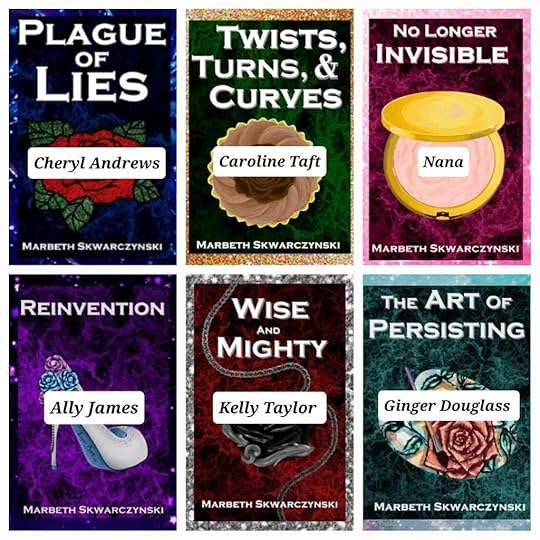
https://thelitlady733988438.wordpress.com/
So how were the reactions to both posts similar? In both cases, the commenters were generous and kind. They were excited to share their favorite books and authors. They cared about the posters and wanted to brighten their day with good information and support. Even if they (like me) were annoyed or frustrated by the “no Pilgrims” poster, they treated her with kindness and compassion. Once again, I was reminded that MOST Christian fiction readers tend to be lovely people who want nothing more than to share their appreciation of stories with whoever asks — genuine seekers and gatekeepers alike.
January 9, 2024
The Juliet Code by Pepper Basham

A historical fiction rom-com mystery, The Juliet Code by Pepper Basham, has a little bit of everything for its readers. The newly-wed couple consisting of a landed gentry husband from England and his adventurous (and detective story-reading) American wife are the main focus. They’re cloying banter is balanced by their love for adventure. Their closest friend just happens to be a world-famous detective whose past is marred by betrayal. In the third installment of the Freddie and Grace Mystery Books, the couple and their detective friend work together to locate the stolen art of a modern master. The added twist? It seems that the series of scenes–all based on Romeo and Juliet–is cursed since the owners of the various paintings end up dead and their collections plundered. Hired by a man who has recently purchased one of the canvases, the three sleuths work together in an attempt to solve the mystery before the curse can strike again.
About the BookBook: The Juliet Code
Author: Pepper Basham
Genre: Christian Fiction/Historical Fiction
Release Date: December, 2023

Newlyweds Lord and Lady Astley Finally Reach Their Honeymoon Destination Only to Encounter a New Mystery in Need of Solving
Frederick and Grace Percy finally make it to Italy to enjoy a delayed honeymoon and explore the beauties of the historic city of Venice. To their surprise, their friend, Detective Jack Miracle, is also in the city, investigating a series of art heists starting at the house of eccentric millionaire, Laraby Covington. Drawn into a world of boat races, mysterious houses, and parties of the rich and unusual in Venice, Frederick and Grace learn of the existence of the Juliet paintings, (Renaissance paintings feature Shakespeare’s tragic heroine) rumored to hold a secret code to an underground vault of similarly treasured artwork assumed lost over the centuries. As Freddie and Grace are pulled deeper into the mystery and their beloved Detective Jack disappears, can they use their wits and work as a team to find the thieves and Jack before it’s too late.
The Juliet Code is a Freddie and Grace Mystery, sequel to The Mistletoe Countess and The Cairo Curse.
Click here to get your copy!About the Author
Pepper Basham is an award-winning author who writes romance peppered with grace and humor with southern Appalachian flair. Both her historical and contemporary novels have garnered recognition in the Grace Awards, Inspys, and ACFW Carol Awards. Her historical romance, The Thorn Healer, was a finalist in the 2018 RT Awards. Her historical romance novels, My Heart Belongs in the Blue Ridge and The Red Ribbon, and her contemporary novels, the Mitchell’s Crossroads and Pleasant Gap series, showcase her Appalachian heritage, as well as her love for humor and family. She currently resides in the lovely mountains of Asheville, NC where she is the mom of five great kids, a speech-language pathologist to about fifty more, and a lover of chocolate, jazz, hats, and Jesus.
More from PepperThe Ever After
I’ve always loved fairytales.
Especially the romanticized version (#romancewriter).
The wonderful sense of a two people meeting, overcoming obstacles to be together, and then the happily-ever-after?
Well, those are some of my favorite reasons to read and write fiction. However, I didn’t realize the challenge I took on when I agreed to write a second and third book with the main characters staying the same!
You know what I mean?
In most series, the main characters from book one become secondary characters in the consecutive books so that the secondary characters in book one can become the main characters in book 2 (everybody still following along? )
One of my favorite book series that do this so well is the Amelia Peabody series. I fell in LOVE with Amelia and Emerson in book one, but just loved watching their continued dynamic as a couple grow with each new book. I felt as if I got to know them so much better in their “ever after” while they engaged in all sorts of adventures together.
So…that’s what I hoped to accomplish with Freddie and Grace.
Where The Mistletoe Countess ends with a happily-ever-after, The Cairo Curse and The Juliet Code take over to show us more of the…ever after – my attempt at showing how two main characters continue to grow beyond the end of book one.
I didn’t realize what a daunting feat it would be. Watching two characters meet, fall in love, and show some growth in book 1 was what I was used to doing. But how was I supposed to continue that character growth in consecutive books?
Well, I had to grow myself as a writer to understand how small changes can make lasting differences especially when writing about a beloved couple.
I think The Juliet Code shows a little of that growth – of our Freddie and Grace have not only matured spiritually and, in Grace’s case, experientially, but also as a couple.
Do you have a series that you love where the main characters stay the same?
Blog StopsThe Sacred Line, December 28
Book Reviews From an Avid Reader, December 28
Bigreadersite, December 28
Texas Book-aholic, December 29
Devoted To Hope, December 29
Mary Hake, December 29
She Lives To Read, December 30
Debbie’s Dusty Deliberations, December 30
Book Butterfly in Dreamland, December 30
Locks, Hooks and Books, December 31
Blogging with Carol, December 31
For Him and My Family, December 31
Where Faith and Books Meet, January 1
Truth and Grace Homeschool Academy, January 1
Back Porch Reads, January 1
Babbling Becky L’s Book Impressions, January 2
Life on Chickadee Lane, January 2
Connie’s History Classroom, January 2
Book Looks by Lisa, January 3
Aryn the Libraryan, January 3
Girls in White Dresses, January 3
Daysong Reflections, January 4
Holly’s Book Corner, January 4
Splashes of Joy, January 4
Gina Holder, Author and Blogger, January 5 (Author Interview)
Wishful Endings, January 5
A Modern Day Fairy Tale, January 5
Becca Hope: Book Obsessed, January 6
Blossoms and Blessings, January 6
Pause for Tales, January 6
Tell Tale Book reviews, January 7
Cover Lover Book Review, January 7
Live. Love. Read., January 7
Labor Not in Vain, January 8
Mornings at Character Cafe, January 8
Worthy2Read, January 8
All-of-a-kind Mom, January 9
Happily Managing a Household of Boys, January 9
The Lit Lady, January 9
Lily’s Corner, January 10
By The Book, January 10
To Everything There Is A Season, January 10
Giveaway
To celebrate her tour, Pepper is giving away the grand prize package of a $25 Amazon eGift card and a print copy of the book!!
Be sure to comment on the blog stops for nine extra entries into the giveaway! Click the link below to enter. https://promosimple.com/ps/293d6/the-juliet-code-celebration-tour-giveaway
January 6, 2024
Room for Everyone
A year ago, I cut my home library by about 75%. An out-of-state move prompted my decision, but there was a secondary reason. I was moving toward a more minimalistic life. I kept items of comfort—including my favorite books—but got rid of the clutter that was wearing me down.


My choice to limit my library had an unexpected benefit. I knew that after our move, I wouldn’t have the space or the money to hoard books the way I once had, so I began to focus more on borrowing books through my subscription to Kindle Unlimited. It has become my primary resource for reading new titles, authors, and genres.
This year, I hit my goal of 104 books read. Over half of those were read using KU. Many of those books were written by 20+ new-to-me authors (most of whom wrote multiple titles in my books read list). https://www.goodreads.com/review/list/19123220-marbeth-skwarczynski?page=1&shelf=2023-challenge&view=covers
This year, my goal is the same: 104 books. It works out to two books a week, a goal that is fairly easy for me to reach with my normal reading schedule. I play audible books while playing Words with Friends, cooking, or doing other chores. Before sleeping every night, I read a chapter or two from a hard-copy book. And, of course, I have a full library on my phone thanks to my Kindle app.
I’ve finished one book so far this year. It’s by a new-to-me author, and I read it on KU. Hope for Christmas is a well-written novella that starts with a Hallmark-like premise but gradually deepens into a more spiritually grounded story that lives up to the season.
And I have six I’m reading now. The hard-copy book on my nightstand is a reread that was originally a Kindle Unlimited selection. I was so impressed by this book by Catherine Brusk that I purchased her entire series. Since January is Human Trafficking Awareness Month, What Love Washed Up was a perfect read to start the new year.
My Audible selection is The Juliet Code by Pepper Basham. It’s a detective caper Rom-Com set at the turn of the last century.
The other four books are ALL Kindle Unlimited selections. Two are by authors I first read last year. I love their work and will continue to read everything they write.
The other two are by new-to-me authors. Their books are incredible. I’ve found two new favorites.
I sell my own books as paperbacks and eBooks from Amazon, but the best way I’ve found to connect with readers has been through Kindle Unlimited. This option has allowed independent authors like me to extend their reach to curious and willing readers.
Not every book I read through KU is a winner, but the service allows me to read widely without risk. It provides an outlet for writers committed to creating the best product after paying for editors and cover designers. It’s another avenue for writers, and despite our occasional crabbing that we’d love to make more money per page, we’re grateful.
It reminds us that there is room for everyone with a story to tell.
December 31, 2023
Small Goals
Since it’s the last day of the year, everyone is making those last-minute plans and resolutions to drive the next 365 days. I’m keeping my plans short and sweet. I have just two goals for the upcoming year:
1. Read 104 BooksIt’s the same goal as last year. It’s a reasonable two books per week. I participate in the annual Goodreads challenge because it reminds me to read. I’ve experienced enough book holes to know I need the ever-present structure of a reading goal.
I reached my goal this year with a whole day to spare. This year, I’m starting with some favorite authors. I’m rereading What Love Washed Up by Catherine Brusk—a phenomenal book I recommend to everyone looking for something wonderful.
When I’ve finished my reread, I’ll move on to the rest of the books in her Finding Faith series.

I have also downloaded the second book in the Rylan Flynn Mystery series by Dawn Merriman.
I read the first one, Spirit Girls, as well as her Maddison series this year, and in 2024, I plan to read the rest of her books.
 2. Publish my WIPS
2. Publish my WIPSI have three rough drafts that I want to publish throughout the next year—in spring, summer, and fall. I only published one book this year, The Art of Persisting, and I’m ending 2023 feeling like a slacker.
One rough is completely done and only needs editing. The other two are in the final rough stages, and I hope to finish them in January.
Other thoughts of resolutions have pressed in on me in these last days of the year, but I’m determined to keep them at bay. My two little goals are more than enough for me to accomplish.
December 24, 2023
Long Live Love by Rena Roberts Review

Long Live Love by Rena Roberts is a memoir by a woman who started breaking generational curses early in her life. Moving back and forth between a drug-addicted mother and an emotionally neglectful father during her childhood left her feeling angry, alone, and vulnerable. The book’s first third digs into these memories, turning them to the light to truly examine the motivations of Rena’s responses and life choices. By the second third of the book, she begins to heal from those abuses with a triple whammy of therapy, salvation in Christ, and spiritual growth. Of course, life isn’t perfect, and like so many women, she gets caught up in the false teaching that promises spiritual protection for her family if she performs according to human-constructed “standards.” This is when Scripture begins to be introduced into the thought-provoking questions at the end of each chapter. The final section deals with the more difficult spiritual journey of letting go and resting in God’s already completed work and is heavily backed by Scripture.
This isn’t a typical Bible study, but it would be a wonderful tool for those in the midst of breaking generational curses and learning how to apply Scripture to their new lives.
About the BookBook: Long Live Love: Walking Out Freedom From Painful Generational Patterns
Author: Rena Roberts
Genre: Spiritual Memoir
Release Date: May 6, 2023

While utterly broken and at the end of herself, Rena Roberts broke free from spiritual bondage…and you can too.
In real life, victory over destructive generational patterns is rare. Psychologists have studied pathological family patterns for decades, trying to discover why they persist but to no avail. Part memoir, part psychological education and application, and part Christian living, Long Live Love is an invitation and opportunity for self-reflection and healing from family-of-origin issues.
Rena Roberts grew up in a profoundly dysfunctional home and set out to create a healthy, loving Christian family of her own. But when her daughter began to rebel in her late teens, Rena found herself stripped of her faith and everything she counted on from God. It was then that He began to radically transform her as she surrendered to His will and word, no matter what.
Rena’s approach to overcoming deep bondage and spiritual darkness will embolden others to go after freedom recklessly and bring the power of God’s supernatural love to their family line. This journey of freedom from generational jail is told in three sections: Longing, Living, and Loving. Each chapter ends with spiritual growth and reflection questions to examine the longings we have throughout our lives, how we try to live differently from our family of origin, and how we can truly love those we never thought we could.
Click here to get your copy!About the Author
Rena Roberts grew up in poverty amongst a profoundly dysfunctional family. She muscled her way through college and a graduate degree in Psychology/Counseling. Rena became a Licensed Marriage and Family Therapist in 1998. She specialized in the treatment of eating disorders for twenty-five years. She has worked as a primary therapist at a residential treatment center, a clinical director of a day treatment center, and in private practice over the course of her career. After homeschooling her three children and holding leadership positions in her local church, she underwent a spiritual crisis that ultimately led to the authorship of her first book, Long Live Love: Walking Out Freedom From Painful Generational Patterns. She now speaks by invitation to various women’s and youth groups sharing her life’s work and God’s work in her so far.
More from RenaI wouldn’t say there’s anything fun about my book. It’s intense and raw and very real. It has been super fun to receive feedback from readers! They love it. They are inspired by it. They all thank me for writing such a vulnerable book. They love the reflection questions. I think my chapters on forgiveness are most inspiring to my readers, and
some have applied the practices I encourage and report to me that it has been life changing, saved their marriages, etc. That’s super fun!
I also realized that I love to write and that I am a writer. I did not know that prior to this project. I hope you enjoy it. I look forward to your thoughts.
Blog StopsBook Reviews From an Avid Reader, December 15
Batya’s Bits , December 16
Artistic Nobody, December 17 (Author Interview)
Chronicles of Courage, December 17
Truth and Grace Homeschool Academy, December 18
Debbie’s Dusty Deliberations, December 19
Guild Master, December 20 (Author Interview)
Texas Book-aholic, December 21
Happily Managing a Household of Boys, December 22
Fiction Book Lover, December 23 (Author Interview)
Splashes of Joy, December 23
The Lit Lady, December 24
A Modern Day Fairy Tale, December 25 (Author Interview)
Locks, Hooks and Books, December 26
JESUS in the EVERYDAY, December 27
Life on Chickadee Lane, December 28
Giveaway
To celebrate her tour, Rena is giving away the grand prize package of a $50 Amazon gift card and a copy of the book!!
Be sure to comment on the blog stops for nine extra entries into the giveaway! Click the link below to enter. https://promosimple.com/ps/29586/long-live-love-celebration-tour-giveaway
December 16, 2023
Just Listen
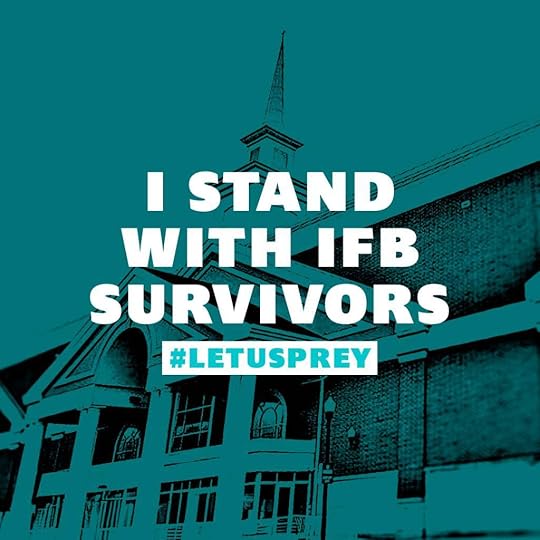
Things will be a little different this weekend at First Baptist of Hammond. Instead of thousands of people gathered to listen to one man and his support team speak from their church’s platform, thousands will assemble outside to ASK that one man and his support team to stay quiet and just listen.
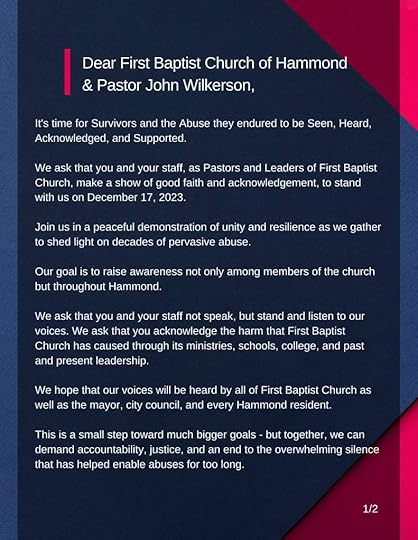
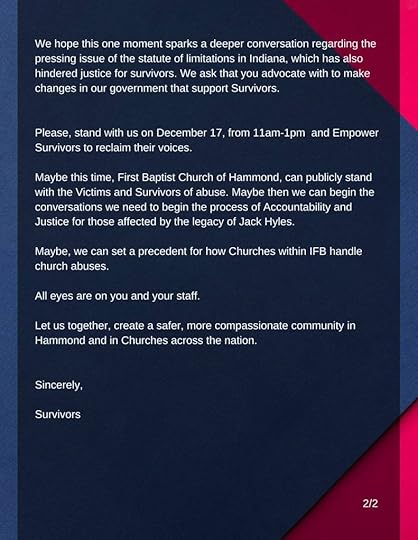
This was the pastor’s response.
While Wilkerson claims that the church has turned over all materials to the police and that he mourns with all of the victims of the church’s past abuse, he has no plans to listen to those at the protest and encourages “private” meetings instead. For many victims, “private” denotes a lack of transparency that is needed to stop abuse once and for all. As he continues his statement, he moves quickly past the harm done to those abused by those in FBCH leadership. He lays out its ministry’s worldwide impact and popularity (claiming it has had more visitors than any other religious institution “Except maybe the Vatican”). This kind of grandiosity is typical for churches within the Independent Fundamental Baptist movement.
For decades, abuse victims in Independent Fundamental Baptist churches have been cajoled or threatened into silence by those whose voices were magnified from the pulpit. They listened to their leaders and believed that speaking up and exposing their abusers would harm the church and make its ministries unavailable to those who needed them most. Though they were the victims, they were punished and shunned while their abusers were allowed to move freely from church to church, working in positions of leadership without remorse or censure.
While many men and women have been forced into keeping the perverted secrets of their spiritual betrayers, those featured in the documentary Let Us Prey have a history of stepping forward to tell their stories. They’ve been interviewed for newspaper articles, talked on podcasts, and given their testimony (backed with hard evidence) under oath in court. https://www.imdb.com/title/tt29926213/?ref_=fn_al_tt_1
And yet, the first reviews of the documentary included people (many from the IFB) complaining that these victims were “Bringing up things that happened decades ago!” and asking, “Why didn’t they mention this stuff when it happened?” or remarking, “Remember, there are two sides to every story.”
The willful ignorance is astounding. It takes a quick Google search to discover that the average age of someone reporting childhood sexual assault is 52 years. It is a lifelong trauma. https://childusa.org/wp-content/uploads/2020/04/Delayed-Disclosure-Factsheet-2020.pdf
One complete viewing of Let Us Prey is enough to realize that the women featured DID mention their abuse and reported it to their religious leaders (consistent with the beliefs of the IFB) and police. As for the “two sides to every story,” That argument has been faced head-on. April Avila, a victim of her youth pastor’s predations, perfectly expressed her frustration in a Facebook post.
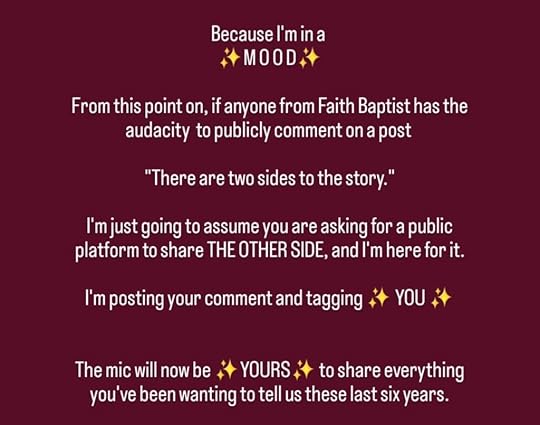
Those still in the Independent Fundamental Baptists (IFB) tend to look at any criticism as an attack from the world and the devil. This WILL be the stance they take regarding the protest in Hammond. Those at First Baptist will see the protest as spiritual oppression. Other IFB churches will take up their cry and pray for their persecuted brethren. How do I know? Because this is what they have always done. Their churches have often claimed that someone in their leadership is being harassed by someone “lying” about them. Sometimes, they will pay for a U-Haul so the leader can move to another location. If the police have gotten involved, the church may even raise money for that person’s defense, sometimes AFTER that person was found guilty in a court of law and sentenced for their crimes.
None of this information is new, but times are changing, and more avenues of communication and education have opened. Victims are refusing to retain the guilt that has been heaped upon them by their abusers and their churches. They are reclaiming their voices and refusing to be silenced.
They are peacefully protesting and demanding that, for once, their churches listen.
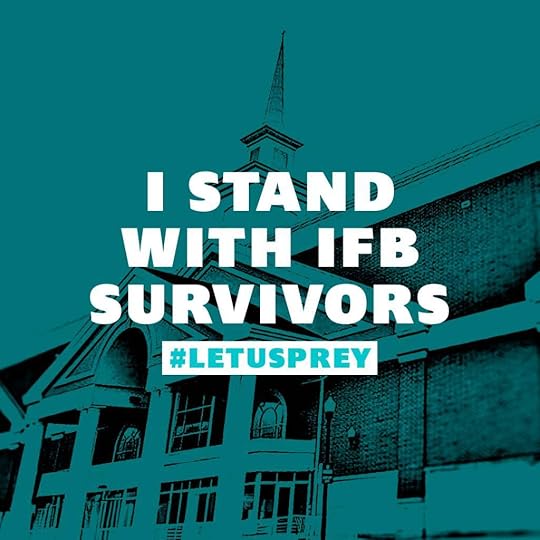
If you want to support the First Baptist of Hammond protest, use the above graphic as your temporary profile picture. When referring to the protest, use the hashtags #LetUsPrey and tag First Baptist Church of Hammond and Pastor John Wilkerson. Let your voice be heard.
December 9, 2023
To Count or Not to Count—Why Is This Even a Question?
Years before I joined Goodreads (or even knew what Goodreads was), I was a book counter.
I would use a journal-type calendar and write the name of the book I’d read and maybe a note about whether I loved or hated it. Then, I’d put a number next to the title. It was my way of keeping track of how many books I’d completed so far during the year.

When, after several people suggested it to me, I finally joined Goodreads, I discovered that the app had a yearly reading challenge. When you sign up, you quote the number of books you’d like to read throughout the upcoming months, and as you read, they are added to the challenge’s total. For a while, I kept my journals while doing the online record, but eventually, I only did the Goodreads challenge to keep track of my books. https://www.goodreads.com/
But with Goodreads, there was a twist—for me. I took on the extra challenge of writing reviews for nearly every book I read. I say nearly because, among the hundreds of books I’ve read throughout the years, there have been a few where it was kinder for me to say nothing.
It turned out that I enjoyed writing the reviews, although some of my earliest ones were long. When I started sharing reviews online, I discovered that long and passionate reviews for books I loved lost some of their spark if people had to click on several screenshots to read them. I learned to whittle them down to a paragraph or two. Now, I create backgrounds, add star ratings, and the book covers as well. I share my reviews on various social media sites and Amazon and BookBub, tagging authors as I go.
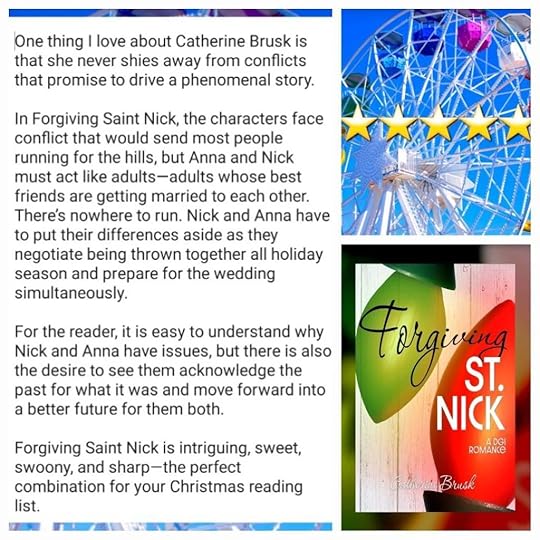
From my first year on Goodreads, I enjoyed the challenge. I excitedly shared my book-reading journey on Facebook and supported my fellow readers, congratulating them when they reached their goals.
However, some in the social media community found the Goodreads challenge and ANY attempt to “keep track” or “count” books extremely offensive. And they made their views known.
Some couched their disapproval in question form.
“Why are you trying to make reading a competition? Just enjoy it!”
“What is the deal with people bragging about all the books they’ve read? Why can’t they just read for the love of reading?”
Others stated their displeasure outright.
“It is so sad that people COUNT the books they read! Where is the joy in that?”
“I’m not setting the Goodreads Challenge trap for myself. Whatever I read, I read!”
“I don’t want to hear how MANY books you’ve read! Just stop it! I want to know what books you’ve ENJOYED!”
It’s a weird little war of words (of books?), and many arguments against reading goals make some strange assumptions. Counters understand that people can count the books they read AND enjoy them. They can have a goal AND have fun. They can complete a challenge AND love reading.
One of the things I’ve noticed is that the book counters are focused on their reading goals. If they comment on someone else’s, it’s complimentary and encouraging. I’ve never read a post where a book counter suggested that anyone who didn’t count is somehow “less than.” I’ve never read a post where a book counter boldly announced that anyone who didn’t count wasn’t a “real” reader.
Those adamantly against counting have somehow gotten the impression that the counters are trying to push them into a mold and force them into a competition they don’t want to be in. But the anti-counters are defending themselves against a group that isn’t trying to be offensive.
Book counters aren’t worried about anyone else’s reading habits. They aren’t demanding that anyone follow the same goals they’ve set for themselves. They are focused on what THEY are reading and aren’t thinking about anyone else’s reading strategies.
As for the big question anti-counters have, WHY do we count? I won’t speak for others here, but I have reasons for using this strategy.
I like having a goal—when I finish a book, I not only get pleasure and joy from the reading itself, but I also have a sense of completion. It feels good.I’m reminded to write reviews. One of the things I like the most about Goodreads is that it prompts the user to leave a review and a rating. These tools are vital to writers, and I want to offer whatever help I can to them and their future readers.I’m less likely to stick with a book I don’t enjoy—this is new for me. When I taught, I would push myself to read books that might be considered “classics,” “important,” or even “award-winning” precisely because I needed to be aware of them. Now that I’m writing full-time, I can adjust my reading to my personal tastes, so unless I’ve offered to read and write a review as part of a promotional team, I only read what I enjoy. If I don’t like the book or decide it just isn’t for me, I’ll stop and pick up a new one.I’m encouraged to actively seek out new books and authors—having a goal of X number of books means that books must be chosen. This year alone, I’ve discovered a half-dozen new-to-me authors whose talent makes me want to read everything they’ve written.I’m reminded to read—I have many things that vie for my attention. After writing all day, I might find it easier to watch a movie or television show (and I do) and ignore the books I’m currently reading. Having a goal nudges me to pick up the hardcopy book on my nightstand or open an ebook on my phone during television commercials. It reminds me to turn on my audiobook when cooking, folding laundry, or creating an ad for my novels.I’m less likely to fall into a “book hole”— probably one of the most frustrating things for a reader. The last time I fell deep into the abyss of a book hole, I was reading one of those “award-winning” books I mentioned earlier. It took so much time and effort to slog through that I didn’t want to expend my energy on other stories. When that monster of a book was finished, I didn’t want to read again for over a year. It was horrible. I couldn’t get into anything. I took a break from the Goodreads Challenge and let myself go blank. But the following year, I signed up for the challenge again—with a meager number of books as my goal—and slowly got back into reading. That’s also when I stopped reading books I hated. My “Did Not Finish” pile got quite large this year—but my new authors and favorite books pile got even bigger. I’ve used the Goodreads Competition to seek out books I love.Other “counters” might have different reasons for participating in the challenge, but it doesn’t matter. They are using a strategy that works for them. If they are excited about their goals and post about how many books they’ve read, give them a virtual pat on the back and tell them congratulations.
Or, if you find their excitement over achieving a goal offensive, please scroll past the post without leaving any negative comments and continue to read your books in a way that serves you best. It could be that maybe—just maybe—that post wasn’t meant for you.

December 2, 2023
“What Most People Do”
Because I am an indie writer, I spend significant time daily maintaining my platform. I’ll post memes or ads for my novels or reviews for books I’ve read, but then I’ll also read other people’s posts and fully participate in the discussions on the social media pages I belong to. Sometimes, a poster will write something that hits differently. I end up thinking about it for days. Usually, I can chalk it up to a difference of opinion and let it go. But occasionally, a post or tweet will stick with me.
I think this one stuck because I’ve heard variations on the theme for—well—years—a lifetime, even. But looking at the words on my phone’s screen, I realized the parroted statement was based on falsehoods and control. A commenter was relaying “her” opinions on why people leave churches.
“…what most people do is get offended over ridiculous things while they sit in the pew week after week and don’t contribute.”
I was a lifelong church attendee. I spent most of my adult years employed by AND voluntarily serving at my local church. If anyone left, the whispers were that “they weren’t committed” or “they wanted to attend another church where they wouldn’t feel ‘convicted’ for not serving.” What can I say? I believed those ideas for a lot of years.
Until some of my closest friends left our church, where they had attended as active members, were employed as full-time ministry workers, and participated in multiple ministries. I knew these people and their hearts. They didn’t get offended over ridiculous things. I know that leaving broke their spirits, but they felt they had to go to protect themselves from leaders’ unwanted attention, verbal and emotional abuse, and overwork. The rumors swirled around their exits, too, but this time, I corrected those who were “sure” they knew why these godly women left — because they didn’t know at all. They were repeating what they were told by those who’d helped chase them out.
As for those who “sit in the pew week after week and don’t contribute”? That didn’t fit their description, either.
New people were brought on staff. People who wouldn’t push back against working seven days a week. People who would throw themselves into ministries even if they weren’t a good match for those jobs. We soon had a choir full of people who couldn’t sing and children’s ministry leaders who didn’t like kids.
Over time, people were shifted into positions that better fit their personalities and talents. Still, some viewed the church as a political machine and wanted to increase their power by taking on as many jobs as possible.
I watched some of those women lay claim to specific ministries and push other ladies away, even if those other ladies were more talented and had fewer obligations. The “others” offered their talents freely and were bullied and rejected by those who wanted glory for themselves. The “others” eventually left to find a church where their talents would be accepted and appreciated. And yes, those rumors popped up again — with mock sorrow that the “others” weren’t faithful.
My husband and I got to the point where when we were told someone left to attend another church, we responded with, “Oh, good! I’m so happy for them! It’s important to find a church home where you can worship God as you see fit.” People stopped sharing their rumors with us; we were okay with that.
In our last years at the church where we’d spent three decades, we didn’t hear the rumors about our younger son. We knew why he left — and he had our blessing. He didn’t go to Bible college. Instead, he went to India as the soundman for a documentary crew. After that, he worked as an intern for a church with an attached promotions agency. He got married, and he and his wife chose not to have a honeymoon so that they could go straight to India as missionaries.
So, what was said about him? We found out years later that people were saying he left because he was bitter. After all, everyone knew he was angry that the church leadership was allowing a convicted pedophile to “serve” as worship leader. He was rebellious. Why else would he refuse to attend Bible college like his youth pastor wanted?
When our elder son returned to his home church with his wife and two children, he was ready to serve. He worked full-time as a teacher, was the IT director for church and school, and ran the sound table. He was always on call — and poorly paid for all he did.
His wife came to serve with her artistic talents. The woman responsible for decorating events asked her to draw up some cityscapes as decor for a banquet. My daughter-in-law created multiples based on real cities. Her work was praised — and that put a target on her back. Other women in the church pushed their way in and pushed her out.
She later, with a new member who was also artistically inclined, worked together for over 100 hours one summer to create original pieces for a Vacation Bible School centered on ancient Egypt. The pastor called it the most beautiful VBS he’d ever seen. Cue the placement of another target.
My DIL asked the VBS director for the following year’s theme so they could get an earlier start and requested a babysitter to keep their kids occupied while the moms were creating. His response? “Don’t worry about next year’s VBS. Just take care of your kids.”
My older son and his family left after five years—financially broke and spiritually broken.
I no longer believe that “most people” who leave churches exit because they’ve gotten “offended over ridiculous things.” I also don’t think that “most people” leave after “sitting in a pew week after week, not contributing.” I have discovered the opposite to be true.
My husband and I contributed. There were years when we didn’t even GET to “sit in a pew” because we were busy teaching, leading music, and preaching. We dealt with anxiety and depression but kept working and serving. When we were finally convicted that we needed to leave our toxic situation, I’m sure there were plenty of rumors about us, too.
For some, leaving church might be the only way to protect themselves and find safety. Recently, the documentary Let Us Prey highlighted the issue of sexual, physical, and emotional abuse within the Independent Baptist Church. The women featured in the doc were raised in the IFB culture to constantly work, always serve, and unquestioningly obey. However, those very teachings set them up for the abuses they suffered. No mechanism within their denomination allowed them to say “no.”
In my novels, many characters will leave a toxic church situation and seek a place to worship safely. In Plague of Lies, Scott Andrews goes a step further. After his spiritual mentor betrayed their youth group, he grew up to become a youth pastor himself to guarantee his students had a wholesome and biblical safe space where they could learn and grow.
For Michael Bernard in Reinvention, his safe space was taken from him in elementary school. His abuse, combined with the toxic teachings of purity culture, kept him from finding a church home that he could trust. His experience with his denomination hurts his relationship with Christ—after all, if the people who are telling you what is godly and biblical are ALSO the people abusing you, how can you trust what they say about God? It takes Michael years outside of church to reconnect with the God of his salvation.
Jesus had a special warning for people who hurt children in the name of God. And just so no one misses it, it’s recorded three times:
But whoso shall offend one of these little ones which believe in me, it were better for him that a millstone were hanged about his neck, and that he were drowned in the depth of the sea. (Matthew 18:6)
And whosoever shall offend one of these little ones that believe in me, it is better for him that a millstone were hanged about his neck, and he were cast into the sea. (Mark 9:42)
It were better for him that a millstone were hanged about his neck, and he cast into the sea, than that he should offend one of these little ones. (Luke 17:2)
Of course, this isn’t a demand that child molesters die by drowning. That’s not the point. The crux of these warnings is that the worst punishment concocted by man would be nothing compared to what God will do to that abuser. God still expects us to use law enforcement to address the immediate problem. He’ll handle the eternal problem.
The fact that these verses are so prominent, and yet there are people in church leadership who target children for their gratification, leads me to believe that church leaders who participate and cover up abuse are not believers. They may talk about the Bible or claim to offer “godly council” or claim spiritual superiority as an “anointed man of God,” but they don’t believe the Bible they teach or follow the God they profess.
If you’ve covered up a child being sexually assaulted in your church, you are nothing more than a poser. There is no godliness in you at all. All of your “Morning Minutes,” where you address your congregation online to give them a bit of spiritual direction for the day, mean nothing more than a “sounding brass and tinkling cymbal.” Go take all the seats. You’ve lost your privilege to “speak for God” when a teen girl told you her youth pastor raped her, and you punished HER while paying to relocate her abuser to another church.
The “why people leave the church” question has come up again recently due to the documentary Let Us Prey. Women from churches in multiple locations around the country have stepped forward with eerily similar stories of abuse. They’ve proven without a doubt that the abuse is systemic within the IFB. https://www.imdb.com/title/tt29926213/
But those still in the denomination are assigning blame for the abuse on the victims, claiming that they’ve “left the church” because they are bitter, misguided, and have put their trust in a man (their abusive spiritual leader) instead of in God (who they were introduced to BY their abusive spiritual leader).
For the victims, they have to deal with the fallout of spiritual/church abuse. Even pulling up to a church parking lot is traumatic for them. Going inside to worship or listen to a sermon is impossible. Some cannot hear certain hymns without their bodies going into a trauma response. Others must skip passages of Scripture that were “favorites” of their abuser.
So much has been ruined for them within church walls.
I’ve talked to a few people who have walked into a church service late (to avoid talking to others), sat white-knuckled on the pew while trying to glean something from the sermon, and then practically ran out during the final hymn. They want to be in church. They want to worship. But they can’t trust the institution where they were nearly destroyed. And most are well aware that their “strange behavior” is likely feeding the congregation’s rumor mill.
So, yes, you might notice people sitting in the pew every week “doing nothing.” Or maybe those people sit quietly in services praying for guidance, asking God if this is the church for them. You don’t know what is going on within their hearts. AND you may never know WHY someone has chosen to leave. Guess what? It’s none of your business. Instead of spreading a supposition based on what you have heard, “most people do,” assume they’ve made the right choice for them and their spiritual growth, then go about your day rumor-free.



